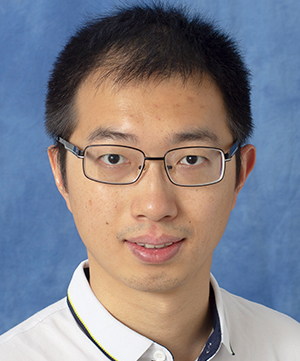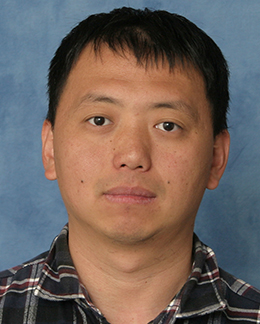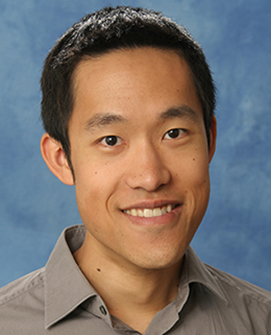Meet LPL Research Postdoctoral Associates
 Chenliang Huang joined LPL in August 2019 as a Postdoctoral Research Associate working with Assistant Professor Tommi Koskinen. His research focuses on developing models of the upper atmosphere of extrasolar gas giant planets to interpret existing observations and to prepare for the NASA Colorado Ultraviolet Transit Experiment (CUTE). Comparing the observed atomic lines (H, He, Na, Mg, Fe, etc.) in the transmission spectrum and the result suggested by the model, he tries to constrain the physical properties of the exoplanet upper atmosphere, such as its temperature, number densities of each species, mass loss rate, and radiation field.
Chenliang Huang joined LPL in August 2019 as a Postdoctoral Research Associate working with Assistant Professor Tommi Koskinen. His research focuses on developing models of the upper atmosphere of extrasolar gas giant planets to interpret existing observations and to prepare for the NASA Colorado Ultraviolet Transit Experiment (CUTE). Comparing the observed atomic lines (H, He, Na, Mg, Fe, etc.) in the transmission spectrum and the result suggested by the model, he tries to constrain the physical properties of the exoplanet upper atmosphere, such as its temperature, number densities of each species, mass loss rate, and radiation field.
Chenliang grew up in Beijing, China. He received his B.S. in Physics in 2011 from the Peking University and earned his Ph.D. in Astronomy from the University of Virginia with Professor Phil Arras and Professor Roger Chevalier (2017). During his graduate program, Chenliang studied the Lyα resonant scattering within the atmosphere to interpret the observed Hα transmission spectrum of HD 189733b, and studied the effect of electron scattering that broaden the emission line of interacting supernovae. Before arriving at LPL, Chenliang was a postdoctoral scholar at the University of Nevada Las Vegas working with Assistant Professor Jason Steffen on the modeling of the interior structure of terrestrial planets. In his free time, Chenliang enjoys playing soccer and hiking.
 Fayu Jiang has been with LPL since March 2019, when he began work as a Postdoctoral Research Associate working with Professor Roger Yelle. Fayu's research focuses on the study of mesospheric thermal structure, aerosols, and wave activities on Mars with stellar occultation data from the Imaging Ultraviolet Spectrograph on board the Mars Atmosphere and Volatile Evolution spacecraft.
Fayu Jiang has been with LPL since March 2019, when he began work as a Postdoctoral Research Associate working with Professor Roger Yelle. Fayu's research focuses on the study of mesospheric thermal structure, aerosols, and wave activities on Mars with stellar occultation data from the Imaging Ultraviolet Spectrograph on board the Mars Atmosphere and Volatile Evolution spacecraft.
Fayu grew up in Qingdao, Shandong Province, China. He received his B.E. in Material Science and Engineering from Shandong University in 2009. He earned his Ph.D. in Astrophysics from the University of Chinese Academy of Sciences in 2015. Fayu's graduate work focused on the study of small magnetic activities on the Sun with SDO and IRIS data. After graduation, Fayu shifted his research interests to planetary aeronomy, working with Professor Jun Cui on the atmospheric escape from Titan with Cassini/INMS data. During his free time, Fayu enjoys playing chess and swimming.
 In May 2019, Antony Trinh began a position as a Postdoctoral Research Associate working with Associate Professor Isamu Matsuyama. Antony's research seeks to constrain the interior structure of planets and moons by interpreting space-geodetically measurable global features, such as their topography, gravity field, tides, rotation, and obliquity. He is also interested in the heat budget and orbital evolution of satellite systems, in connection with the geological activity and tectonic patterns observed over the surface of these bodies.
In May 2019, Antony Trinh began a position as a Postdoctoral Research Associate working with Associate Professor Isamu Matsuyama. Antony's research seeks to constrain the interior structure of planets and moons by interpreting space-geodetically measurable global features, such as their topography, gravity field, tides, rotation, and obliquity. He is also interested in the heat budget and orbital evolution of satellite systems, in connection with the geological activity and tectonic patterns observed over the surface of these bodies.
Antony lived in Brussels, Belgium, before moving to Tucson. He completed his M.S. in Theoretical Physics at Université Libre de Bruxelles. He earned his Ph.D. degree at UC Louvain, conducting research at the Royal Observatory of Belgium on various topics, including the relationship between shape and gravity of planets and moons, the tides and rotation of terrestrial and icy bodies, the dynamics of rotating fluids, and the formation of the Martian moons. Antony's dissertation work combined Cassini's measurements of Enceladus's shape, gravity, and libration into a consistent model of the moon's interior. As a passionate advocate of reproducible research, he also developed a Mathematica package to assist in the theoretical modeling of geodynamic processes. In his free time, Antony enjoys a range of outdoor activities, but will happily move indoors as soon as he runs out of Belgian chocolate.

